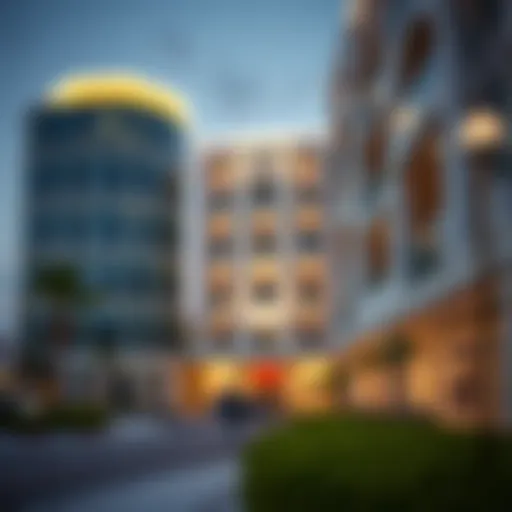Understanding Ramadan's Timing in the UAE


Intro
Ramadan stands as a pillar of cultural and spiritual significance in the UAE, transforming not just the lives of Muslims but also shaping the fabric of the country’s society. As the holy month unfolds each year, understanding the nuances of its timing is crucial for residents—be they Emiratis or expatriates—and investors alike. Unlike fixed dates in the Gregorian calendar, Ramadan is determined by the lunar cycle, which can lead to fluctuations in its commencement from one year to the next.
Delving into this topic reveals a multifaceted landscape where religious observance intersects with lifestyle adjustments, market trends, and community dynamics. This article aims to map out the timeline of Ramadan, exploring its broader implications as well as its impact on various socioeconomic sectors, notably real estate in bustling hubs like Dubai.
In the following sections, readers will gain insights into key trends and projections affecting the property market, while also discovering how Ramadan influences daily life—ranging from communal prayers and iftar gatherings to retail adaptations and residential needs.
The Significance of Ramadan
Ramadan holds profound significance within the Emirati culture and among Muslims globally. This sacred month is not merely a time for fasting; it functions as a veritable reset button for spiritual reflection, community bonding, and cultural introspection in the UAE. The observance of Ramadan serves as a reminder of core values such as empathy, charity, and gratitude, deeply ingrained in the fabric of Emirati life.
Cultural and Religious Context
In the UAE, Ramadan is more than a religious obligation. It is a period steeped in traditions that tie individuals to their past and to one another. The act of fasting from dawn to dusk is believed to cultivate mindfulness and discipline. During this time, Muslims abstain from not only food and drink but also from negative behaviors, fostering self-reflection and growth.
The call to prayer echoes through the streets, inviting folks to engage in spiritual practices, heightened activities in mosques abound. The emphasis on community is palpable, as families and friends come together for Iftar, the meal breaking the fast, fostering an atmosphere of unity and generosity.
Culturally, Ramadan permeates various aspects of daily life, from art to culinary traditions, enriching the Emirati identity. The whole month is marked by a distinctive atmosphere—decorated streets, special Ramadan tents, and an overall feeling of reverence and joy. Moreover, this period aligns with the deep-seated cultural practice of hospitality, as sharing meals becomes an expression of love and camaraderie.
Historical Observances in the UAE
The significance of Ramadan is reflected through its historical observances in the UAE, where locals have celebrated this month for generations. Historical texts indicate that Ramadan was observed in the region very early, maintaining its traditions throughout the years despite the rapid modernization occurring in the UAE.
In the past, the month of Ramadan would often see old customs revived, such as communal prayers at mosques and public gatherings at Iftar. Families would open their doors to neighbors and strangers alike, demonstrating the value placed on community and togetherness. In terms of economic impact, historical accounts show that Ramadan has always inspired heightened generosity, with charitable endeavors ramping up significantly during these few weeks. From donating to local charities to organizing food drives, the spirit of giving takes center stage.
As the UAE continues to evolve into a modern hub, its observance of Ramadan remains a unique blend of the traditional and contemporary. This month’s historical richness serves as a backbone, ensuring that while the world changes and develops, the essence of Ramadan—its core values of familial bonding and charity—remains woven into the nation’s identity.
"During Ramadan, each individual is enjoined to not only reflect personally but to extend compassion to others, enhancing the community spirit that defines the UAE."
Lunar Calendar and Ramadan
The connection between the lunar calendar and Ramadan forms the backbone of understanding this significant period in the UAE. In essence, Ramadan’s timing and observance are profoundly impacted by the moon's cycle, reflecting deeper religious and cultural values.
The lunar calendar, which consists of twelve months, is approximately 29.5 days long. Consequently, each month shifts back approximately ten to twelve days each year in relation to the Gregorian calendar. This sliding scale is crucial for determining when Ramadan begins.
Understanding the Moon Phases
The moon’s phases, shifting from new moon to full moon and back again, play a pivotal role in the Islamic calendar. As such, Ramadan is initiated with the sighting of the new moon. The moon sighting not only marks the commencement of the holy month but also signifies the beginning of a time devoted to reflection, prayer, and communal activities.
In practice, the moon sighting might sometimes lead to different local start dates for Ramadan within the UAE, as each emirate may base its observance on its own lunar observations. This can create a fascinating patchwork tapestry of celebrations and rituals across the country, emphasizing the diversity of Emirati culture. The process of moon sighting is a blend of tradition and astronomy, where local communities rely on both experienced observers and astronomical calculations.
"The crescent moon holds profound significance, marking not just the beginning of Ramadan, but also the unity of the Muslim community around the world."
How Ramadan Dates are Determined


Determining the exact start date requires more than simply tracking the lunar cycle; it involves religious authorities and traditional practices. The United Arab Emirates has put measures in place to ensure that the beginning of Ramadan is recognized nationally and uniformly.
- Official Announcements: In the UAE, religious authorities, specifically the Moon Sighting Committee, review reported sightings of the moon. The committee typically convenes on the 29th day of Sha'ban, the month preceding Ramadan.
- Cultural Observance: Community participation is vital. Families gather to wait for the announcement that Ramadan has commenced, sharing in the anticipation, highlighting the collective spirit of the holy month.
- Astronomical Calculations: Modern astronomy aids in predicting the start date, yet the final decision rests on the actual lunar sighting. This blend of tradition and science makes the process uniquely enriching.
Through understanding the lunar calendar's relation to Ramadan, one can grasp not only the modifying lifestyles and practices but also the broader cultural identity that it fosters in the UAE, offering profound insights for investors and expatriates alike. As each year passes, the cycle of Ramadan invites the community to explore its themes of spirituality and reflection, resonating deeply in every corner of the country.
Ramadan Start Dates in Recent Years
Understanding the start dates of Ramadan each year provides invaluable insight, not just for observant Muslims, but also for those involved in various sectors in the UAE, including real estate and tourism. The shifting start dates impact community activities, business hours, and social interactions. This section highlights the significance of yearly variations and official observations, framing them within the broader context of Ramadan's influence on day-to-day life.
Yearly Variations
Ramadan is observed for 29 or 30 days depending on the lunar cycle, which means it can shift by approximately ten days earlier each year. This inconsistency results from the differences between the lunar calendar and the Gregorian calendar. Being cognizant of these variations helps businesses and residents adjust their strategies accordingly. Key points regarding yearly changes include:
- Modifying business practices: Retailers often change their schedules and operations to cater to the shifts in timings for iftar and suhoor (pre-dawn meal), impacting foot traffic and sales.
- Social plans: Friends and families may find it difficult to synchronize their gatherings, as the moving start dates impact evening plans.
- Investment movements: Real estate developers and investors need to consider the Ramadan timing when planning projects, ensuring that launches align with consumer engagement and community spirit.
The trend in the commencement of Ramadan creates a kind of rhythm across the UAE, unique to its diverse populace and vibrant culture. One might say that just as the moon waxes and wanes, so too do the opportunities and challenges that arise from this holy month's calendar.
Observations by Local Authorities
Official recognition of Ramadan’s start is generally marked by announcements from local religious authorities, like the UAE’s Moon Sighting Committee. They consider a few factors when determining the exact date:
- Astrological calculations: These help predict the visibility of the new moon, which signals the beginning of Ramadan.
- Community impact: Announcements are made considering the vast population of expatriates from varied cultures; local authorities strive to provide clear guidelines for all residents.
“The announcement of Ramadan’s start is always met with excitement and anticipation among communities, shaping their lives and activities during the month.”
In addition to the religious and cultural significance, understanding these observations is vital for:
- Business forecasting: Companies can estimate seasonal demands based on Ramadan’s start.
- Event planning: Festivals and social events are often linked to this timing, influencing participation rates among residents.
- Cultural exchange: Expat communities engage more with Emirati traditions, enriching the collective experience.
Understanding Ramadan’s start dates in the UAE sheds light not just on this holy month but also on how it influences various facets of life, from daily responsibilities to communal engagements. For investors and expatriates, grasping these shifts allows for strategic planning and fosters an appreciation of the rich cultural tapestry that defines Ramadan.
Impact of Ramadan on Daily Life
The occasion of Ramadan brings not only spiritual reflection but also a significant transformation in daily life across the United Arab Emirates. Understanding the implications during this holy month is crucial for both residents and expatriates alike. The changes in routine emphasize the importance of community, respect, and adherence to cultural values that define this period.
Changes in Working Hours
As Ramadan unfolds, one of the first noticeable differences is in working hours. Public and private sector organizations often adjust their schedules to accommodate the fasting times. Typically, many companies implement shorter workdays, allowing employees to leave early, usually around 3 PM or even earlier. This shift is aimed at giving people ample time to prepare for iftar, the meal that breaks the fast, and to rest ahead of the next day’s fast.
- Private Sector: Many businesses may adopt a flexible approach, allowing employees to choose their hours based on personal needs.
- Public Sector: Government bodies often set official hours, which tend to be strictly adhered to.
Ramadan and the Real Estate Market
In the UAE, Ramadan holds significance not just as a spiritual observance but also as a catalyst for changes in the real estate market. This holy month influences various sectors, with property investment trends shifting dramatically as it approaches. As understanding the timing and effects of Ramadan can greatly benefit investors, it is crucial to analyze how this period reshapes the dynamics of property transactions and rentals.
Investment Trends During Ramadan


During Ramadan, investment behavior in real estate often experiences noticeable fluctuations. Property investors tend to reflect a blend of prudence and opportunity-seeking. With fasting hours impacting daily life, the market usually sees a gradual slowing down in activity early on. As the month progresses, however, things can heat up. Investors familiar with past Ramadan cycles prepare for a surge in demand post-Iftar hours when people are more likely to engage in property viewings and discussions.
Moreover, Ramadan can also entice foreign investors considering investment into the UAE market. This interest often correlates with the increase in hospitality and leisure-focused properties, as tourists flock during Eid celebrations following the fasting period. Knowing the cultural subtleties associated with Ramadan equips investors with an edge in timing their deals effectively.
Opportunities for Investors
Seasonal Promotions
One of the notable features during Ramadan is the array of seasonal promotions offered by real estate companies. These promotions often include discounted rates, favorable payment plans, or even fully furnished properties at special prices. Such incentives are designed to attract buyers who might otherwise hesitate, recognizing that the sentiment during Ramadan shifts toward community and generosity.
These promotions stand out because they tap into the spirit of giving that defines Ramadan. Investors can see them as an opportunity to snag a property at a beneficial price. However, it is essential to approach these offers critically—some may come with strings attached or be part of marketing strategies rather than genuine discounts.
Rental Market Dynamics
Alongside seasonal promotions, rental market dynamics also shift during Ramadan. Many landlords adapt their strategies, offering short-term leases and flexible payment options to cater to the influx of expatriates and visitors seeking temporary housing. For instance, furnished apartments become particularly appealing to those looking to spend the month in the UAE and returning for Eid celebrations.
This dynamic makes it a favorable time for investors focused on rental income, especially if they can adjust property offerings to meet the evolving demand. Analyzing local market trends during Ramadan can reveal hot spots and emerging neighborhoods that may benefit from seasonal adjustments. However, investors should balance the benefits with considerations of property management during this busy month, ensuring that any changes can be managed without compromising service quality.
"The significance of Ramadan extends into investing, shaping how and when properties are bought and rented throughout the UAE."
Understanding these aspects of Ramadan’s influence on the real estate market positions investors to capitalize on opportunities that arise while also preparing for the unique challenges presented during this time.
Community and Emirati Traditions
In the UAE, Ramadan isn’t just a month of fasting; it serves as a profound cultural anchor for Emirati communities. The communal aspects of Ramadan bolster bonds between families, friends, and neighbors, reinforcing the values of unity and generosity. As expatriates and locals partake in various traditions, the impact on social fabric becomes clear, creating a mosaic of cultural practices that resonate through generations.
Iftar Gatherings
Iftar — the meal to break the fast at sunset — holds a place of honor during Ramadan. It’s not merely about nourishment but about community and fellowship. Families gather at home, inviting friends and neighbors over, turning each meal into a celebration. Even more, larger events at mosques and community centers provide opportunities for broader gatherings.
- Sharing and Inclusivity: You often see tables filled with dishes from different parts of the world, showcasing the multicultural nature of the UAE. Dishes range from traditional Emirati fare like harees and ujja to international cuisines that reflect the resident population.
- Spiritual Time: Iftar gatherings often include prayers before the meal, emphasizing the spiritual aspect of breaking fast. This moment reflects the collective celebration of faith and community.
"Iftar is like a thread that weaves us together, no matter where we come from. It's beautiful to see so many cultures come together around a table during this month."
Community Engagement
The spirit of Ramadan transcends personal fasting; it becomes a call to action for community engagement. Various local organizations prompt initiatives to help the less fortunate, creating opportunities for charity and support. This outreach becomes particularly vital during Ramadan, as many feel motivated by their faith to give back.
- Charity Drives: Collaborative efforts often include food drives where community members donate non-perishable items to support struggling families. Other initiatives may involve volunteering at soup kitchens or food distribution centers.
- Cultural Events: Many cities organize events focusing on the rich heritage of Emirati traditions during Ramadan. These can range from storytelling sessions to art exhibitions that showcase local traditions, fostering understanding and appreciation among diverse communities.
In essence, the traditions and communal practices during Ramadan not only enhance the spirit of the month but also build lasting relationships. This unique cultural tapestry illustrates how closely communities can knit together when they share experiences, beliefs, and meals. Such engagements create a deep well of traditions that, while rooted in religion, also exhibit the UAE's welcoming nature.
Tourism and Ramadan
The intersection of tourism and Ramadan in the UAE serves as a vital thread in the fabric of its economy and cultural identity. Known for its opulent architecture and vibrant lifestyle, the nation transforms during this sacred month. As the sun sets and the fast concludes, the bustling streets come alive with activities, drawing both residents and visitors into a unique experience. With Ramadan ushering in a period of reflection and camaraderie, the tourism sector must adapt to cater to the diverse needs of travelers, making it essential to understand the nuances involved in this remarkable blend of spirituality and hospitality.


Hospitality Sector Adaptations
Hotels and restaurants in the UAE are required to make meaningful adjustments during Ramadan, fostering an environment that respects the customs while still engaging tourists. For instance, many establishments keep their services open throughout the day but do so discreetly—opting for screening to allow guests to dine. There are also dedicated Iftar menus, often showcasing traditional Emirati cuisine and global fusion dishes that create an inviting atmosphere.
Moreover, special packages are crafted to entice tourists. Hotels might offer Ramadan-exclusive discounts or themed events designed to elevate the guest experience. Travelers can immerse themselves in the local culture while savoring the rich culinary delights that come with Iftar and Suhoor, creating lasting memories.
Unique Experiences for Visitors
Ramadan provides a unique backdrop for cultural experiences that are hard to find elsewhere. Visitors have the opportunity to engage in several noteworthy traditions, such as:
- Participating in Iftar Gatherings: Tourists can join local families or community events, allowing them to experience the spirit of Ramadan firsthand.
- Exploring Mosque Open Days: Many mosques open their doors to visitors, providing insights into Islamic practices and fostering interfaith dialogue.
- Attending Cultural Festivals: Events like the Dubai Ramadan Festival bring together art, music, and food, showcasing the rich heritage of the UAE while celebrating inclusiveness.
“The essence of Ramadan is about community, reflection, and understanding; therefore, these experiences profoundly resonate with visitors.”
Additionally, guided tours focusing on the history and significance of Ramadan can provide an enriching perspective. Such engagements not only enhance the visitor's journey but also reinforce the UAE's commitment to cultural exchange and mutual respect. With careful navigation, the tourism sector can ensure that both local customs are honored and that visitors leave with a deeper appreciation of Ramadan's profound influence on Emirati society.
Health and Wellbeing During Ramadan
Understanding the nuances of health and wellbeing during Ramadan is essential, particularly in a diverse environment like the UAE. As Muslims across the nation observe fasting from dawn until sunset, it's important to navigate the challenges and benefits that arise from this unique time. Observing Ramadan isn't just a spiritual undertaking; it encompasses physical health and mental clarity, aspects that deserve thoughtful consideration.
Nutrition Considerations
During Ramadan, the nutritional choices made during the pre-dawn meal (Suhoor) and the evening meal (Iftar) are particularly crucial. Opting for balanced meals can significantly impact energy levels throughout the day. Here are a few key points to keep in mind:
- Hydration is Key: After a long day of fasting, the body may crave immediate hydration. However, it’s wise to pace yourself. Begin with water or dates to gently wake your digestive system.
- Nutrient-Rich Foods: Focus on including fruits, vegetables, whole grains, and lean proteins during Suhoor. Avoid overly salty or sugary foods, which can lead to dehydration and energy crashes.
- Moderation is Important: While the tradition of breaking fast can lead to large meals, it's better to eat smaller portions initially. This helps the body adjust and reduces the risk of discomfort.
- Incorporate Healthy Fats: Foods rich in healthy fats, like avocados and nuts, can promote satiety and provide long-lasting energy.
"A well-balanced meal during Ramadan might just be the difference between a sluggish day and one filled with vitality."
When preparing meals, also consider the time constraints many face. Choosing quick yet nutritious recipes can help maintain health during this period. Engaging with local culinary traditions by trying out Emirati dishes can also make the experience enriching.
Mental Wellbeing Practices
Mental health is another crucial aspect during Ramadan. Fasting can indeed be a spiritually uplifting experience, but it can also bring about challenges to one's mental state. Here are approaches to support mental wellbeing during this month:
- Mindfulness and Meditation: Engaging in mindfulness practices can help maintain focus and serenity during the physically demanding fasting hours. This can be as simple as allocated quiet time for reflection.
- Community Connections: Reaching out to family and friends for Iftar gatherings fosters a sense of belonging. Participating in community initiatives can enhance emotional health, as being part of something larger can provide reassurance and comfort.
- Adequate Rest: Sleep patterns may shift during Ramadan, leading to fatigue. Prioritizing rest ensures one stays balanced and more resilient throughout the day.
- Positive Affirmations: Daily affirmations can help cultivate a positive mindset. Simple statements of appreciation for the blessings of Ramadan can uplift spirits and enhance one's mental state.
Maintaining wellbeing during Ramadan is about balance. By attending to both physical needs and mental health, residents and expatriates can enhance their Ramadan experience, making it a truly meaningful time.
Culmination
The conclusion of our exploration into Ramadan’s timing in the UAE serves as an essential component of comprehending the complete picture of this significant period. This holy month is not merely a calendar mark; it wields considerable influence on various aspects of life in this vibrant nation.
Reflecting on Ramadan's Influence
Ramadan generates multifaceted consequences that extend beyond the spiritual realm. For many expatriates and investors, understanding the nuances of its timings helps navigate the local lifestyle adjustments.
- Cultural Adjustments: Ramadan alters daily life—business hours shift, social norms evolve, and public observances intensify. Those who are aware of these changes can better integrate into the community.
- Real Estate Insights: The period surrounding Ramadan provides investment opportunities that savvy investors leverage. There’s a noticeable uptick in the hospitality sector, embracing the spirit of community and generosity during this month.
- Health Awareness: Underestimating the impact of fasting can lead to health implications. Understanding how Ramadan affects nutrition and mental wellbeing can inform better practices for maintaining one’s health throughout the month.
- Economic Ripple Effects: Seasonal trends, such as increased consumer spending during Iftar gatherings, affect local markets and properties. Investors can capitalize on these trends by targeting properties that cater to this seasonal influx.
"Timing is everything. Understanding Ramadan's rhythm can mean the difference between success and missed opportunities."
In light of these considerations, the ultimate significance of Ramadan in the UAE shines through, informing both cultural engagement and practical decisions in business. This month isn’t just about fasting; it encapsulates a way of life—intertwined with traditions, economic ventures, and community spirit.
Engaging with Ramadan thoughtfully not only enhances one’s experience but can also unveil pathways for fruitful investment and deeper community ties. A well-rounded comprehension of this period clearly holds notable advantages for anyone looking to thrive in the UAE—be they investors, expatriates, or residents alike.











